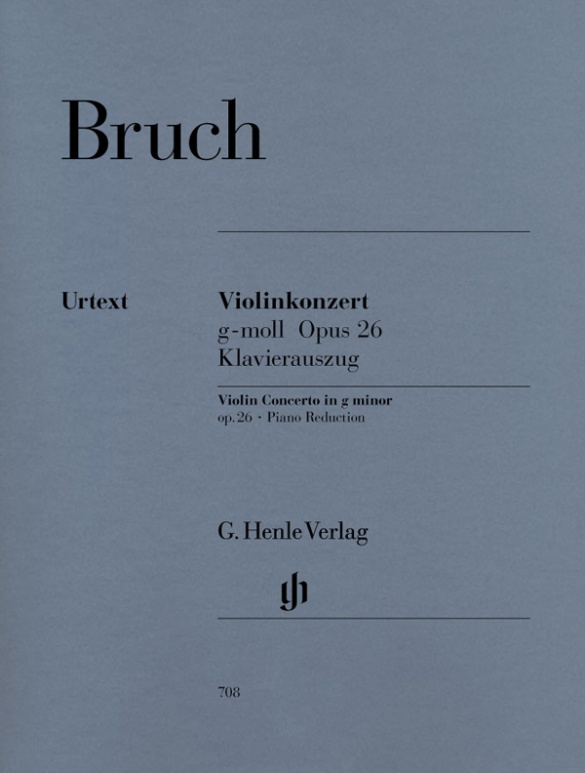

Max Bruch
Violin Concerto g minor op. 26
It made its creator world-famous and added a towering masterpiece to the standard repertoire: Max Bruch’s First Violin Concerto in g minor. Now it’s appearing at last in an urtext edition from Henle. Bruch himself was not always overjoyed at his work’s popularity: "I can’t listen to this concerto anymore," he once complained to his publisher Simrock, "do you suppose I’ve only written one concerto?" By now the Bruch Concerto has found a permanent place in the world’s concert halls. Henle’s edition provides not only a razor-sharp urtext for the solo part, but a preface that alone is worth the price of the volume: who could have guessed that the concerto went through a convoluted genesis with multi-layered revisions, and that some of the changes go back to the famous violinist Joseph Joachim?
Content/Details
(Explanation)
Exclusively in the Henle Library APP
Fingerings by: Vadim Gluzman, Rudens Turku, Tianwa Yang
About the Composer
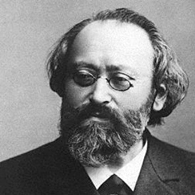
Max Bruch
A German composer of the Romantic period. Stylistically, his works outline a counter-aesthetic to the New German School. His violin concerti are particularly significant, but he also wrote numerous choral works, cantatas, oratorios, songs, stage works and orchestral pieces.
| 1838 | Born in Cologne on January 6. He received his first musical training from his mother, a singer. |
| from 1849 | Music instruction from Heinrich Carl Breidenstein. Writes many compositions even though still a child. |
| 1852 | Scholarship recipient of Frankfurt’s Mozart Foundation. |
| 1853–57 | Studies composition with Ferdinand Hiller in Cologne. |
| 1858 | Premiere in Cologne of his opera “Scherz, List und Rache” (“Jest, Cunning, and Revenge”), op. 1. |
| from 1858 | In Leipzig he associates himself with those around Mendelssohn. |
| 1862 | Moves to Mannheim. |
| 1863 | Premiere in Mannheim of his opera “Die Loreley,” op. 16. |
| 1865–67 | Music director in Koblenz. Composes his Violin Concerto no. 1 in G minor, op. 26. |
| 1867–70 | Court musical director in Sondershausen. Composes his Symphony no. 1 in E-flat major, op. 28, dedicated to Johannes Brahms, and Symphony no. 2 in F minor, op. 36 (both in 1870). |
| 1870–78 | Freelance composer in Berlin and Bonn. Composes the oratorio Odysseus, op. 41 (1871/72). |
| 1879/80 | Composition of the Fantasy in E-flat major, op. 46 (Scottish Fantasy) for violin and orchestra. |
| 1880–83 | Director of the Philharmonic Society in Liverpool. |
| from 1883 | Travels to the United States. Director of the Breslauer Orchesterverein (Wrocław Orchestral Society). |
| from 1891 | Director of the composition masterclass at the Berlin Academy of the Arts. Honorary doctorate from Cambridge University (1893), and membership of the Académie des Beaux Arts (1898). |
| 1907 | Vice-President of the Academy of the Arts, Berlin. |
| 1920 | Dies in Berlin on October 2. |
About the Authors
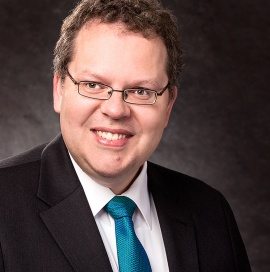
Michael Kube (Editor)
Dr. Michael Kube, born in 1968 in Kiel, studied musicology (with Friedhelm Krummacher and Heinrich W. Schwab), the history of art and ethnology at the Christian-Albrechts-Universität zu Kiel. Since 1998 he has been a research associate at the New Schubert Edition (Tübingen) and since autumn 2002 also a member of the editorial board.
Kube is on the panels of different juries and music prizes, and is also a member of the Committee for work evaluation (Werkprüfungsausschuss) of VG Music Edition. His research interests include music for keyboard instruments around 1700, 19th century chamber music, early 20th century music history, as well as Scandinavian music history.
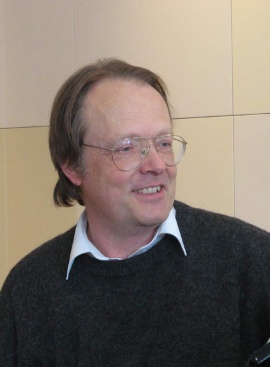
Johannes Umbreit (Piano reduction)
Prof. Johannes Umbreit studied the piano at the Musikhochschule in Munich. From 1987 onwards he was a regular accompanist at courses given by Wolfgang Schneiderhan, Thomas Brandis, Ljerko Spiller, Igor Ozim, Olga Woitowa, Ernő Sebestyén, Walter Nothas, F. Andrejevsky, Denis Zsigmondy and Zakhar Bron amongst others. He has appeared in numerous radio and TV broadcasts and plays chamber music with members of the Bavarian State Orchestra, the Munich Philharmonic Orchestra and the Bavarian Radio Symphony Orchestra.
He is on the jury of different international competitions and has been invited to several international music festivals. Umbreit was a teacher for almost ten years at the Musikhochschule in Munich and at the same time a lecturer for chamber music and piano accompaniment at the Richard Strauss Conservatory. Since 2008 he has been a lecturer at the Hochschule für Musik und Theater München. As the long-serving managing director of the Richard-Strauss-Gesellschaft, he was made an honorary member of the board in 2009. In May 2011, the Bavarian Minister of Culture appointed Johannes Umbreit an honorary professor of the Hochschule für Musik und Theater München on the suggestion of its academic senate.
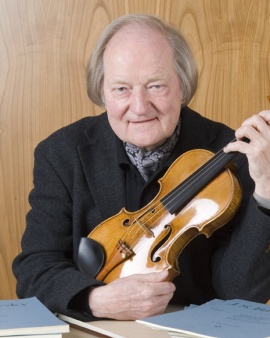
Kurt Guntner (Fingering and bowing for Violin)
Prof. Kurt Guntner was born in Munich on Mozart’s 183rd birthday. He studied the violin with Ludwig Ackermann, Max Rostal and Henryk Szeryng. At the age of 18, he made his solo debut in the Kongreßsaal at the German Museum in Munich, performing Beethoven’s Violin Concerto with the Munich Philharmonic Orchestra. At the age of 22 he was appointed first concertmaster with the Bavarian State Orchestra. After 10 eventful years at the Bavarian State Opera with conductors such as Ferenc Fricsay, Joseph Keilberth and Hans Knappertsbusch, Rudolf Kempe invited him to become the first concertmaster with the Munich Philharmonic Orchestra, giving him the opportunity to perform the violin solo in many of the great violin concertos.
Of particular appeal were the BR’s invitations to perform and record great violin concertos that were seldom played, including those by Casella, Schillings, Szymanowsky. Kurt Eichhorn initiated this series– Jan Koetsier, Marek Janowski and others conducted other concertos. Kurt Guntner was also first concertmaster with the Bayreuth Festival Orchestra for many years, and played with the Munich Bach Orchestra under Karl Richter, in the Association of Soloists in The Bach Week in Ansbach and with the Münchner Bachsolisten. In 1972 he founded the internationally acclaimed ODEON-TRIO, together with the cellist Angelica May and the pianist Leonard Hokanson, touring all over the world with them for 25 years. In 1976 Guntner was called to the tenured chair of violin at Munich’s Hochschule für Musik und Theater, teaching students from around the world for 28 years.
He made numerous recordings for radio, television, record and CD. Karl Schumann described Guntner’s broad musical personality thus: “Kurt Guntner is a practical orchestral musician, soloist, chamber musician and educator in one person”.
In 1997 Kurt Guntner was awarded the order of merit (first class) of the Federal Republic of Germany.
Kurt Guntner died on 9 January 2015 in Munich.
He was closely associated with G. Henle Publishers for several decades. Since the end of the 1980s he had produced numerous Urtext editions of works for violin for the publishing house, sharing pedagogically polished bowings and fingerings for different works including violin concertos by Bach, Haydn, Mozart, Bruch and Tchaikovsky, as well as numerous other editions.
Product Safety Informations (GPSR)

G. Henle Verlag
Here you can find the information about the manufacturer of the product.G. Henle Verlag e.K.
Forstenrieder Allee 122
81476 München
Germany
info@henle.de
www.henle.com
With extensive informative notes about different editions of the score, this is a well-produced edition of a popular repertoire item.
AUSTA Stringendo, 2017The complex genesis of the work is unravelled in a comprehensive preface and all the various sources have been scrutinized in producing this fine edition.
Sheet Music, Winter 2003recommendations
autogenerated_cross_selling
Further editions of this title
Further editions of this title


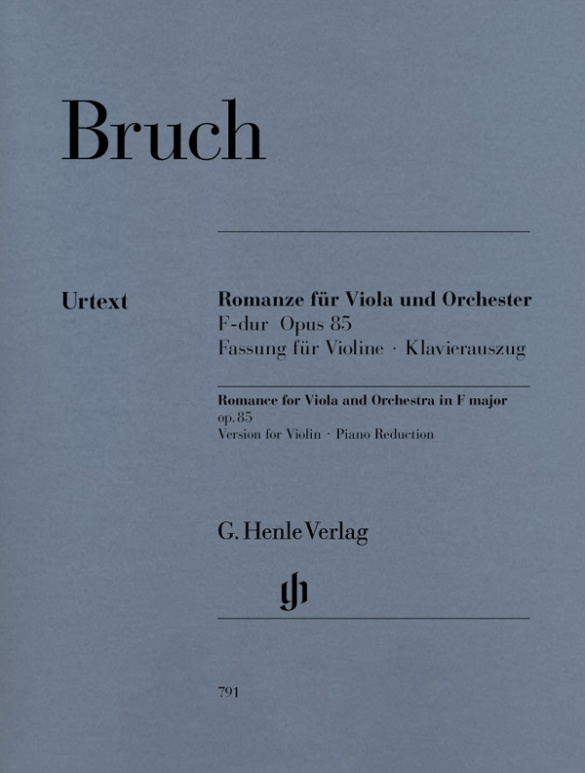

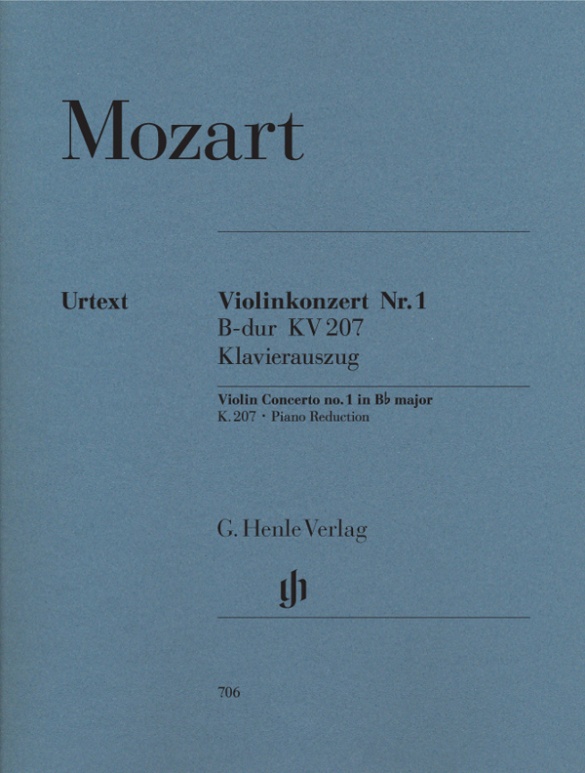
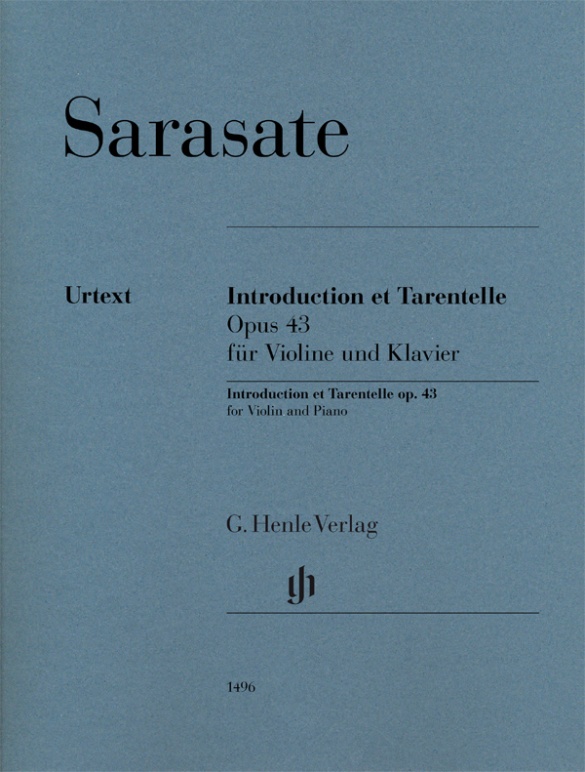
Orchestral material from Breitkopf & Härtel